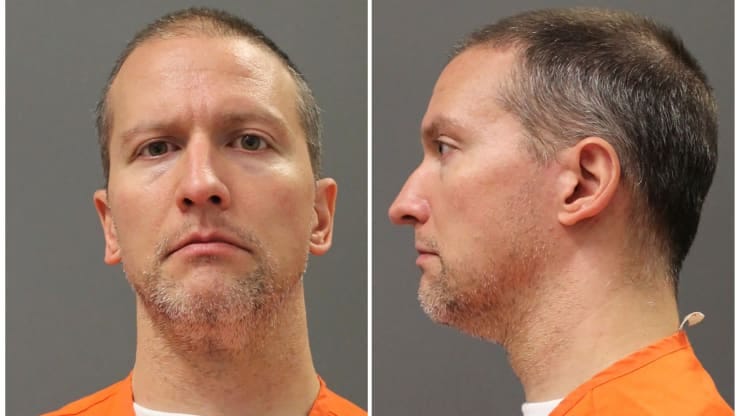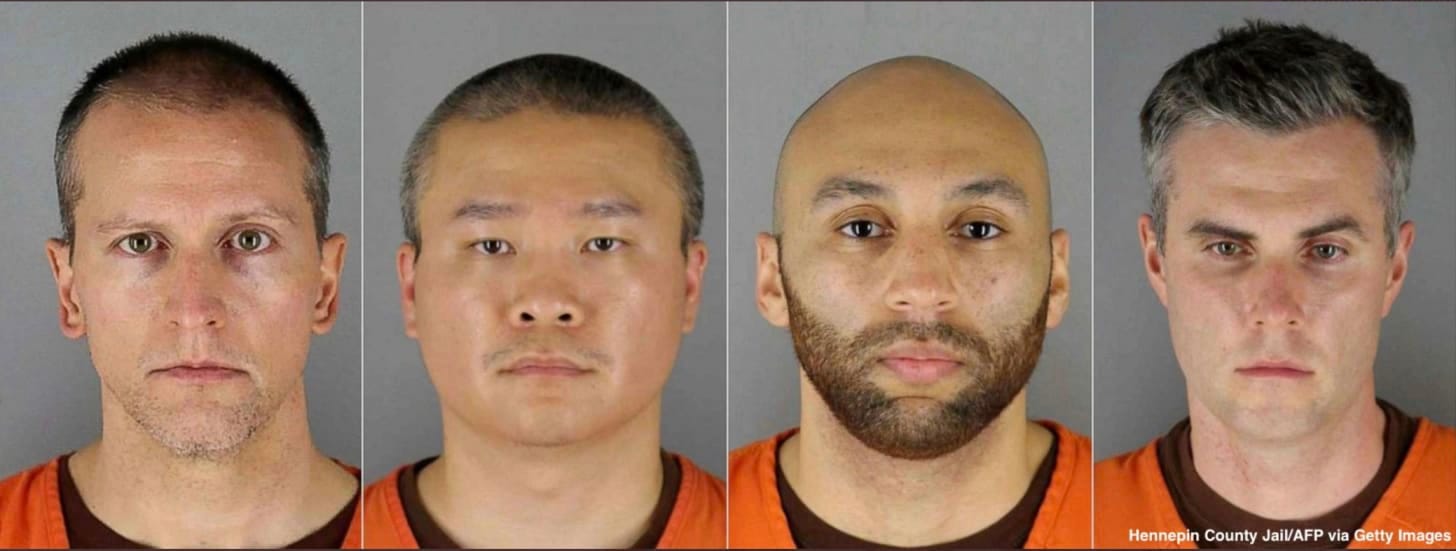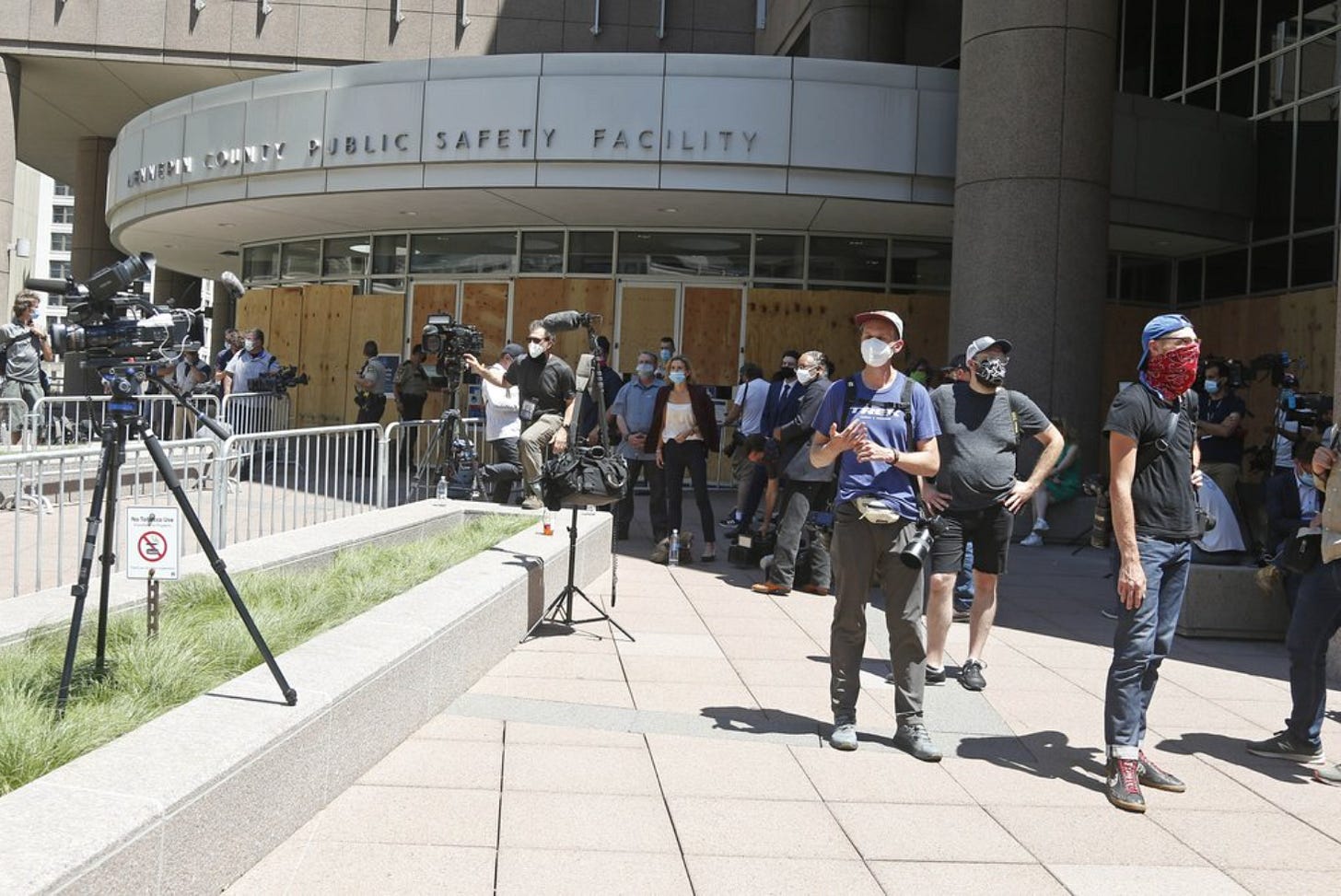Hennepin County Judge Jeannice M. Reding kept bail set at $1 million for former Minneapolis police officer Derek Chauvin, pictured below, who appeared in court today for a bond hearing on the additional count of second-degree murder, charged by Minnesota Attorney General Keith Ellison last Wednesday. The judge also gave Chauvin the option of a higher bond of $1.25 million, whereby fewer court mandated conditions for his release would attach.

(Undated booking photos of Derek Chauvin, former Minneapolis police officer accused of murdering George Floyd, taken after he was transferred from a county jail to a Minnesota Department of Corrections state facility. Via Minnesota Department of Corrections.)
During the 11-minute bail hearing, Derek Chauvin, said almost nothing while appearing on closed-circuit television from the state’s maximum security prison in Oak Park Heights. The bail was kept at $1 million with the imposition of court restrictions and $1.25 million with less restrictions imposed upon his release.
There is also the option for Chauvin to be released after posting $1 million bail if he agrees to abide by conditions that include appearing for all future court appearances, not working in a security capacity, and not possessing firearms or retaining a firearms permit.
The hearing today was to give attorneys the chance to contest the higher bail amounts. Eric Nelson, Chauvin’s attorney, did not contest the figure for the increased bail, nor did he address the substance of the charges. In addition to the new charge, Chauvin is also still charged with third-degree murder and second-degree manslaughter as alternative charges.
A conviction of second-degree murder in Minnesota carries a maximum penalty of 40 years in prison; third-degree murder carries up to 25 years; and manslaughter up to 10 years. Moreover, the sentences for the other officers depend on the future conviction of Chauvin. If Chauvin is convicted of second-degree murder, the other three former officers who have been charged with aiding and abetting could face the same 40-year maximum.

(The mug shots of four former Minneapolis officers who have been charged in connection to the murder of George Floyd.From L to R: Derek Chauvin, Tou Thao, J. Alexander Kueng and Thomas Lane. Photo via Hennepin County Jail.)
Minnesota law requires the defendant to “[cause] the death of a human being, without intent … while committing or attempting to commit a felony offense” in order to satisfy the charge of unintentional second-degree murder. Prosecutors allege that Chauvin killed George Floyd while in the commission of the felony crime of assault.
In order to prove third-degree murder, prosecutors must demonstrate that Chauvin caused Floyd’s death by actions “eminently dangerous to others and evincing a depraved mind, without regard for human life.” While the concept of “evincing a depraved mind” has been the subject of courtroom debate and some legal scholars argue that it is a potentially harder charge to prove, the second-degree murder charge is entirely appropriate based on the evidence and should therefore not be as difficult to prove.
First-degree murder, which has not been charged in this case, would require a whole new level of evidence and standard of proof for prosecutors, who would have to prove to a jury that Chauvin had the premeditation and intent to murder Floyd. This would also require that prosecutors establish a likely motive for the murder. The option of charging Chauvin with first-degree murder is still available to Ellison, but will not likely be charged for these reasons.

(Members of the media members wait outside the Hennepin County Public Safety Facility during the first court appearance for former Minneapolis police officer Derek Chauvin, on Monday, June 8, 2020 in Minneapolis, MN. Photo by Jim Mone, via AP.)
Bringing multiple alternative charges against all of the officers involved in this matter gives the jury a choice of how to convict and increases the chances of a conviction on at least one charge. If jurors struggle to come to a consensus, the possibility of multiple charges allow for a compromise verdict, with a conviction on one charge and acquittals on the others.
This method assists in alleviating the issue of jurors being torn and therefore refusing to convict at all — it is the best way to make sure the jury has the option to compromise by satisfying both sides in the event that a juror is unsure of a verdict. Considering that the extent of the charges for the other officers involved hinge on the level of conviction for Chauvin, it is critical that prosecutors cover their bets from all angles by adding charges at every level.
Derek Chauvin is due to appear in court next on the afternoon of June 29.
Posts like this are made possible by paid subscriptions from readers like you, which allow me to keep posting critical news for the public like this. By getting a paid subscription to SHERO, you will be getting exclusive content not available to everyone while supporting independent journalism for everyone. Please consider getting your paid subscription today.
Amee Vanderpool writes the “Shero” Newsletter and is an attorney, contributor to magazines and newspapers and analyst for BBC radio. She can be reached at avanderpool@gmail.com or follow her on Twitter @girlsreallyrule.




For the life of me, I still can't fathom the hatred that must have existed in Derek Chauvin's heart as he suffocated the life out of a defenseless George Floyd. I don't want to, either.
He doesn't look so tough without all that police gear now, does he?